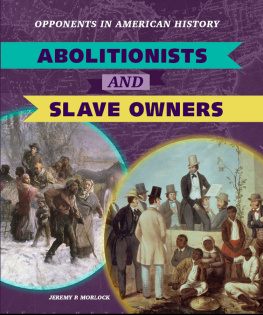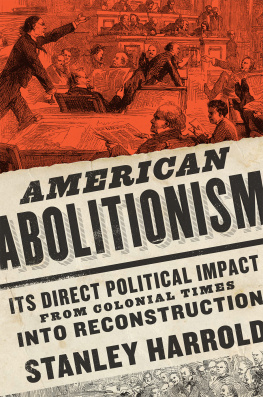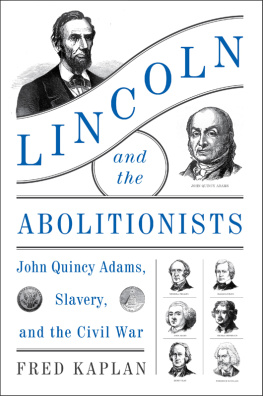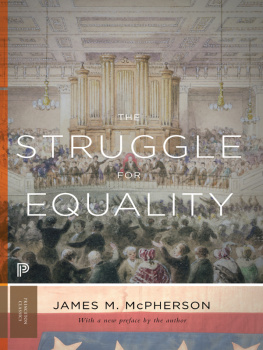Barakaldo Books 2020, all rights reserved. No part of this publication may be reproduced, stored in a retrieval system or transmitted by any means, electrical, mechanical or otherwise without the written permission of the copyright holder.
Publishers Note
Although in most cases we have retained the Authors original spelling and grammar to authentically reproduce the work of the Author and the original intent of such material, some additional notes and clarifications have been added for the modern readers benefit.
We have also made every effort to include all maps and illustrations of the original edition the limitations of formatting do not allow of including larger maps, we will upload as many of these maps as possible.
THE ABOLITIONISTS
A COLLECTION OF THEIR WRITINGS
BY
LOUIS RUCHAMES
Preface
As the reader will notice, the great majority of selections included in this volume were written during the 1830s and early 1840s. It was during those years that the Abolitionist movement made its greatest contribution to American life and faced its most difficult tasks: to awaken public opinion to the horror of slavery and to stimulate it to take action against the evil. It was during those formative years that the leadership and philosophy of the movement crystallized. On the one hand, issues which were to split the movement into two were born then; on the other, the philosophy and strategy of each of the contending factions took form within that period and were not to undergo any significant change until the Civil War.
The selections written during the later period have been chosen because they either illuminate the earlier years or, as in the case of William Lloyd Garrison, they are a fitting close to an aspect of history in which Garrison was the overshadowing figure.
John Brown is not included here because his efforts belong to a much later period and because a large representative sampling of his letters, speeches and other writings is to be found in this writers volume, A John Brown Reader , published by Abelard-Schuman in 1960.
I am grateful to Prof. Sidney Kaplan, of the University of Massachusetts, for reading the manuscript and offering many valuable suggestions.
Introduction
The character of a city is determined by the character of the men it crowns, once remarked Wendell Phillips, quoting the Greek orator Aeschines. Applying the lesson to modern times, there are few periods in American history that offer as remarkable an opportunity for the molding of American character to the highest standards of humanity as that in which the men and women known as Abolitionists lived and wrought. Devoted to the ideals of brotherhood and equality of opportunity for all men, their consciences seared by the heartlessness of slavery in the South and racial prejudice in the North, they consecrated their lives to the eradication of both evils. Encompassed by both indifference and hostility, subjected to social ostracism, economic sanctions and physical violence for daring to condemn institutions and customs which were regarded as vital to the welfare of American society and therefore sacrosanct, they stubbornly and heroically continued their efforts until victory in the war against slavery was achieved.
The nature of the revolution wrought by the Abolitionists may best be assessed by placing ourselves in the year 1829, immediately before the rise of the modern Abolitionist movement. In December of that year, the American Convention for Promoting the Abolition of Slavery and Improving the Condition of the African Race held its twenty-first biennial convention at Washington, D.C., with delegates present from New York, Pennsylvania, Maryland, Washington, D.C., and Alexandria, Virginia. Formed thirty-five years earlier in an attempt to unite the efforts of existing state and local anti-slavery groups, the organizations successes and failures during the intervening years were highlighted in three notable reports to the convention.
In the first, Benjamin Lundy, one of the great anti-slavery pioneers, enumerated its successes. These were an increase in the number of anti-slavery advocates from very few to thousands, some of them among the most influential characters in the nation; the complete abolition of slavery in certain states, particularly Rhode Island, Connecticut, New York, New Jersey, Pennsylvania, Ohio, Indiana and Illinois; and the passage of the Missouri Compromise in 1820 which had prohibited the extension of slavery north of 36 30.
The failures were detailed in two other reports which noted no visible improvement in the treatment of the slave since 1790, the year of the first census, but rather an alarming increase in the number of slaves from 694,280 to about 2,000,000 and a tripling in the area devoted to slavery from an original 212,000 to nearly 600,000 square miles. Most disturbing, however, one report noted, was the public apathy toward all efforts to help the slave, which are viewed in the light of encroachment on the established order of society, for so deeply has the system of slavery become rooted in the soil, that even those who are not directly interested in its continuance, are not disposed to aid by their countenance, or afford us assistance in pecuniary mannerand thus our usefulness is checked, and our endeavors to lay before the public the train of evils attendant on a state of slavery are retarded...
That the anti-slavery movement, in the light of its own statements in 1829, had marched into a cul-de-sac which required heroic efforts on its part to extricate itself, seems evident today. The greatest need was a re-examination of its basic strategy which had been based upon moderation and temperance in describing the nature of slavery and the responsibility of the slaveholder; the espousal of gradualism and colonization of former slaves to areas outside the United States as the most feasible methods of hastening the end of slavery; and an emphasis upon convincing the slaveholder that it was to his economic interest to liberate the slave and utilize free labor instead.
The results of this strategy were the very opposite of what its proponents had intended. The recourse to a very cautious moderation in language, and the avoidance of any language likely to antagonize the slave-owner, simply minimized the inherent evils of the institution and the responsibility of the slave-owner for the suffering of the slave and made it more difficult to awaken the public conscience to a recognition of the evil; the appeal to self-interest foundered upon the reality of slavery as a source of wealth to the master and his family; the policy of gradual emancipation provided an excuse for doing nothing immediately and salved the consciences of those who were indisposed to take vigorous action; while colonization, recommended by the American Colonization Society since 1816and by many who were sincerely interested in helping the slaveactually hindered emancipation and the struggle for equal rights for the Negro. For colonization assumed the inferiority of the Negro and regarded his presence in this country as a danger to white American society and thus reinforced the very arguments which were being used to keep him in slavery and to deprive him, when free, of the rights of a white man.








